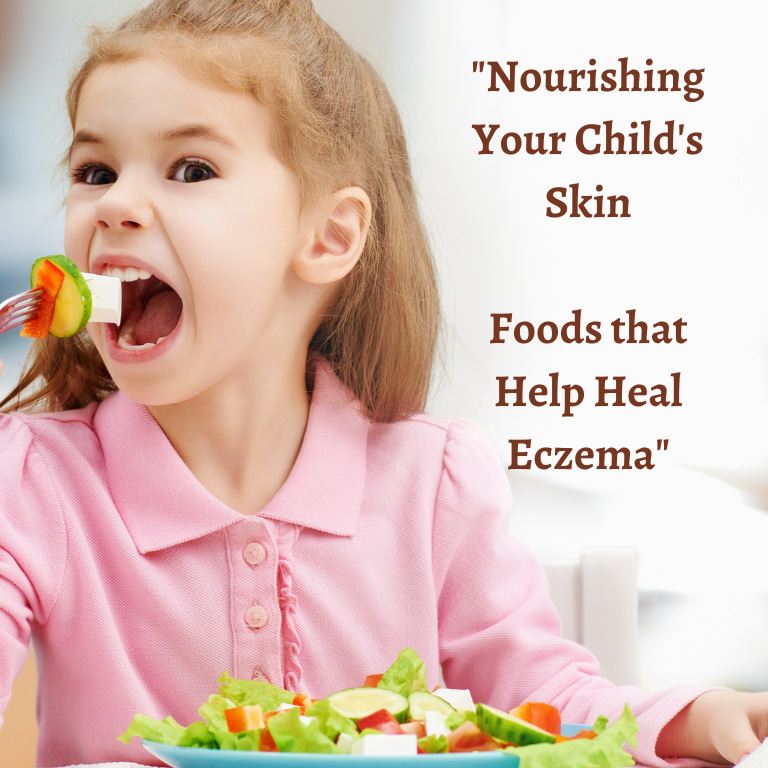
“Nourishing Your Child’s Skin: Foods that Help Heal Eczema”
Eczema is a common skin condition in children that can cause dry, itchy, and irritated skin. While there is no cure for eczema, incorporating certain foods into your child’s diet can help to reduce symptoms and promote healing.
Here are the top 5 foods that can help heal eczema in kids:
Fatty Fish

Fatty fish, such as salmon, mackerel, and sardines, are rich in omega-3 fatty acids. These fatty acids have anti-inflammatory properties that can help to reduce redness, itching, and swelling associated with eczema. Fatty fish, such as salmon, mackerel, and sardines, are rich in omega-3 fatty acids, which have anti-inflammatory properties and are essential for healthy skin. In children with eczema, low levels of omega-3 fatty acids have been linked to increased inflammation and skin irritation.
Consuming fatty fish can help to supplement the body’s natural stores of these essential fatty acids, which can then help to reduce inflammation and improve skin health. In addition to its anti-inflammatory effects, omega-3 fatty acids also play a role in maintaining the skin barrier and preventing water loss, which can help to keep the skin hydrated and reduce the risk of flare-ups.
It’s important to note that not all children with eczema will benefit from increased omega-3 fatty acid intake and that some children may need more individualized treatment plans. However, for many kids, incorporating fatty fish into their diets can be a helpful addition to their overall eczema management plan.
Probiotic Foods

Probiotics, such as yogurt and kefir, can help to balance the gut microbiome and boost the immune system. A healthy gut microbiome is crucial for maintaining skin health, and a robust immune system can help to reduce the frequency and severity of eczema outbreaks. Probiotic foods contain beneficial bacteria that can help to promote a healthy gut microbiome, which is closely linked to skin health. In children with eczema, an imbalance in the gut microbiome has been associated with increased inflammation and skin irritation.
Consuming probiotic-rich foods, such as yogurt, kefir, miso, sauerkraut, and kimchi, can help replenish the gut’s beneficial bacteria and restore balance to the microbiome. This, in turn, can help to reduce systemic inflammation and improve skin health.
In addition to promoting a healthy gut microbiome, probiotics have also been shown to have a direct anti-inflammatory effect on the skin. This can help to reduce the severity of eczema symptoms and improve overall skin health.
It’s important to note that not all children with eczema will benefit from increased probiotic intake and that some children may need more individualized treatment plans. However, for many kids, incorporating probiotic-rich foods into their diets can be a helpful addition to their overall eczema management plan.
Leafy Greens

Leafy greens, such as spinach and kale, are rich in vitamins and minerals that are important for skin health. They are also a great source of antioxidants that can help to protect the skin from damage.
Leafy greens, such as spinach, kale, and collard greens, are rich in vitamins and minerals necessary for skin health, including vitamins A, C, and E, as well as iron and magnesium. These nutrients help to support the skin’s natural defense mechanisms and promote skin healing.
In addition, leafy greens are also high in antioxidants, which help to protect the skin from damage caused by free radicals. This can be particularly important in children with eczema, as the skin is often more sensitive and prone to oxidative stress.
A diet rich in leafy greens can help provide the skin with the nutrients it needs to maintain its natural barrier function and reduce the risk of flare-ups. Leafy greens can also help to support a healthy gut microbiome, which has been linked to improved skin health.
It’s important to note that not all children with eczema will benefit from increased leafy green intake and that some children may need more individualized treatment plans. However, for many kids, incorporating leafy greens into their diets can be a helpful addition to their overall eczema management plan.
Nuts and Seeds

Nuts and seeds, such as almonds and chia seeds, are a good source of healthy fats and essential fatty acids. These nutrients are necessary for maintaining skin hydration and preventing dry, itchy skin.
Nuts and seeds are a good source of essential fatty acids, particularly omega-3 fatty acids, essential for skin health. These fatty acids help to maintain the skin’s natural barrier function and reduce inflammation, which can be particularly beneficial for children with eczema.
For example, nuts such as almonds and walnuts are rich in vitamin E. This antioxidant helps protect the skin from damage caused by free radicals. Seeds, such as flaxseeds and chia seeds, are a good source of alpha-linolenic acid, an omega-3 fatty acid that has been shown to have anti-inflammatory effects on the skin.
Consuming a diet that includes a variety of nuts and seeds can provide the skin with the essential fatty acids it needs to maintain its natural barrier function and reduce the risk of flare-ups.
It’s important to note that not all children with eczema will benefit from increased nut and seed intake and that some children may need more individualized treatment plans. However, for many kids, incorporating nuts and seeds into their diets can be a helpful addition to their overall eczema management plan.
Berries

Berries, such as strawberries, blueberries, and raspberries, are a rich source of antioxidants and phytochemicals that can help to protect the skin from damage and support skin healing.
Incorporating these foods into your child’s diet can help to improve skin health and reduce the symptoms of eczema. It is also essential to avoid foods that can trigger eczema outbreaks, such as dairy, gluten, and soy.
Berries can be a beneficial food for children with eczema as they are packed with antioxidants, vitamins, and minerals that can help support skin health. Here are a few ways in which berries can help heal eczema in kids:
Antioxidant-rich: Berries, especially dark berries such as blueberries and blackberries, are rich in antioxidants such as anthocyanins and vitamin C, which can help to protect the skin from oxidative damage and reduce inflammation.
Vitamin C: Vitamin C is an essential nutrient that plays a vital role in the production of collagen, a protein that gives the skin its structure and strength. By providing the body with adequate vitamin C, berries can help support the skin’s health and integrity.
Essential fatty acids: Berries are a good source of essential fatty acids such as omega-3 and omega-6, which can help to maintain the integrity of the skin’s barrier and reduce the risk of dry, itchy skin.
Fiber: Berries are also a good source of fiber, which can help to support digestive health and improve the absorption of nutrients from food.
Incorporating a variety of colorful berries into your child’s diet can be a simple and delicious way to support their skin health and help heal eczema.
As with any dietary changes, it’s essential to speak with a healthcare provider or a nutritionist before making any significant changes to your child’s diet.
Although diet plays a significant role in healing any skin issue, however, there can be various other factors that should be considered to heal eczema from the root cause.
I have helped thousands of my patients to heal their eczema holistically & naturally – I can help you too!
If you would like to discuss how I can help you or your child to help manage Eczema or any other skin issue you can dealing with, email me at contact@holisticskinwellness.com.
